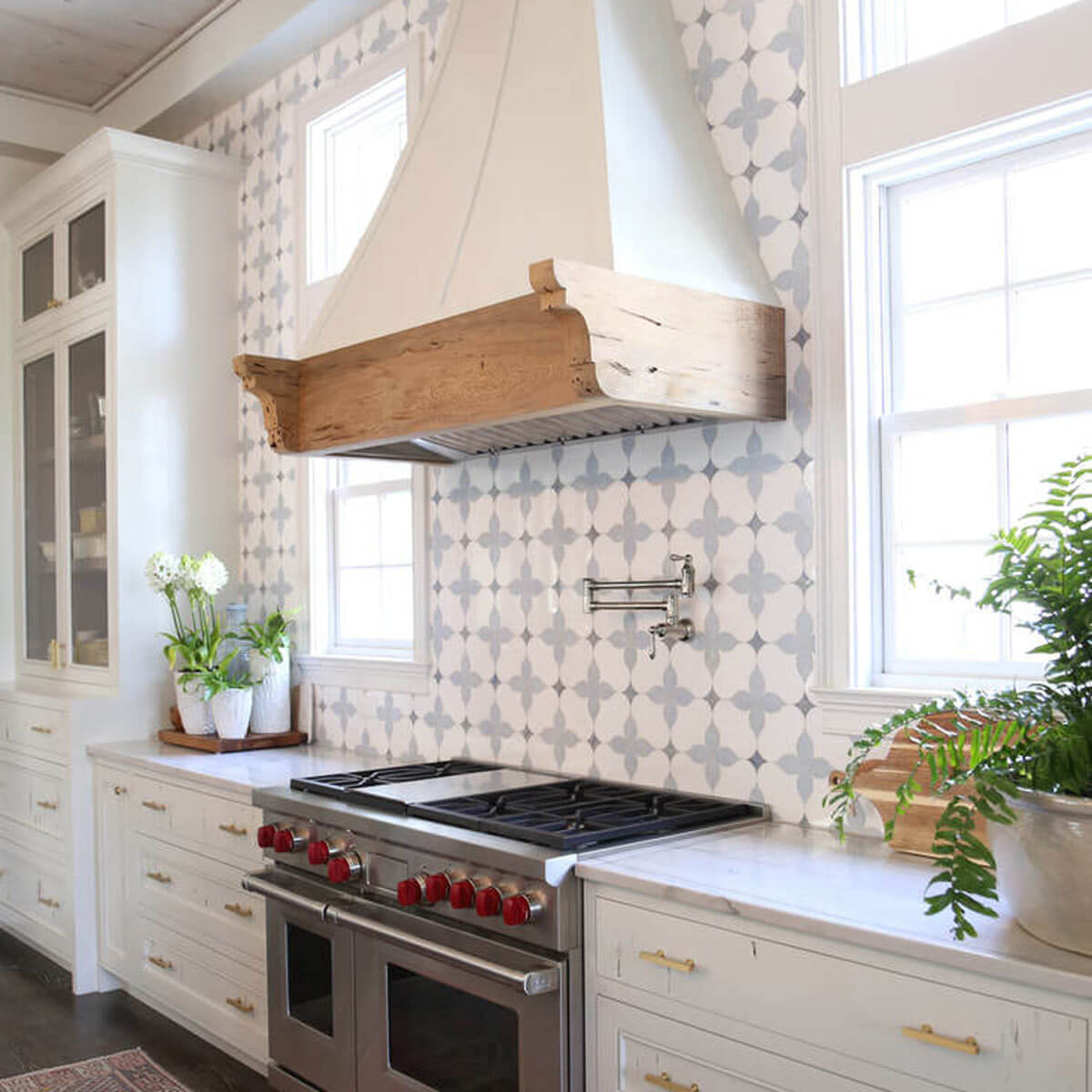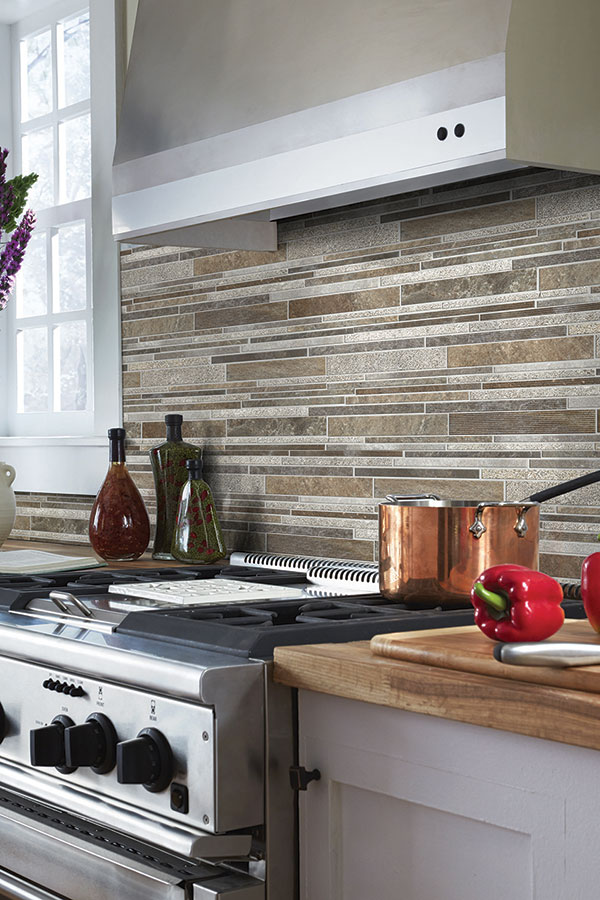Have you ever admired the stunning backsplash tile in a friend’s kitchen and wondered if it could also look equally beautiful on their floors? Many homeowners ask this question, drawn to the stylish versatility of backsplash tiles. While they’re primarily designed for the wall, using them on the floor isn’t entirely out of the question. It’s a topic that often sparks debate among DIY enthusiasts and professionals alike, prompting a closer analysis of the pros and cons.

Image: www.helpful-kitchen-tips.com
This article dives deep into the world of backsplash tiles and their adaptability to floor applications. We’ll explore the considerations that govern this choice, from the characteristics of the tiles to the potential drawbacks. You’ll gain a comprehensive understanding of when backsplash tile is a suitable flooring option and when it’s best to stick to traditional floor tiles. So, let’s get started on this illuminating journey into the realm of tile versatility.
Backsplash Tile: More Than Just a Kitchen Feature
Backsplash tile, typically found adorning kitchen and bathroom walls, is a highly versatile material. It comes in a dazzling array of colors, patterns, and textures, providing endless possibilities for customization. But what makes backsplash tile so popular? It’s the combination of its aesthetic appeal and practicality. Backsplash tiles are very easy to clean, resist stains, and can withstand splashes and spills, making them ideal for high-traffic areas.
Now, when considering if backsplash tile can be used on the floor, it’s important to remember that it’s not a one-size-fits-all solution. While some backsplash tiles might handle the wear and tear of foot traffic, others are better suited for walls only. Factors such as the tile’s material, thickness, and the type of glaze play a significant role in determining its suitability for a flooring application.
Backsplash Tile for Flooring: Unveiling the Possibilities
While backsplash tile isn’t a common choice for flooring, there are instances where it can be a viable option. Certain types of backsplash tiles possess the strength and durability needed to withstand the rigors of foot traffic.
Types of Backsplash Tiles for Floor Use
Here are some types of backsplash tile that can be considered for flooring:
- Porcelain Tiles: Known for their exceptional durability and resistance to scratches and stains, porcelain tiles are a popular choice for both backsplashes and floors. Their dense composition and low porosity make them ideal for high-traffic areas.
- Ceramic Tiles: Ceramic tiles offer a versatile and affordable option for floors. While not as durable as porcelain tiles, they are still suitable for moderate foot traffic. Choose ceramic tiles with a high PEI rating (Porcelain Enamel Institute) for greater wear resistance.
- Glass Tiles: Glass tiles offer a sleek, modern aesthetic. While they may not possess the strength of porcelain or ceramic tiles, they can be used in areas with light foot traffic, like a bathroom or mudroom.
- Stone Tiles: Natural stone tiles, such as granite, marble, and slate, are known for their elegance and durability. However, they can be more expensive than other options and require proper sealing to prevent stains.

Image: www.flooringamerica.com
Choosing the Right Backsplash Tile for Flooring
When selecting backsplash tile for flooring, several key factors are crucial:
- Tile Thickness: Backsplash tiles are usually thinner than floor tiles. A thicker tile offers greater durability and stability under foot traffic.
- Glaze: A durable glaze is essential for flooring applications. Look for tiles with a high-gloss or matte glaze that can withstand scratches and abrasion.
- PEI Rating: The PEI (Porcelain Enamel Institute) rating indicates a tile’s wear resistance. For flooring, choose tiles with a PEI rating of 3 or higher.
- Slip Resistance: For flooring, especially in wet areas, slip resistance is vital. Ensure that your chosen tile possesses a good anti-slip rating.
The Challenges of Using Backsplash Tile on Floors
While some backsplash tiles can be used on the floor, there are potential challenges that you need to consider.
Potential Drawbacks:
- Durability: Backsplash tiles are generally designed for walls, so they may not be as durable or resistant to scratches as traditional floor tiles.
- Thickness: Thin backsplash tiles can be more prone to cracking or chipping underfoot.
- Installation: Installing backsplash tile on the floor requires special considerations, such as using the right mortar and grout for the specific application.
- Maintenance: Some types of backsplash tile, such as glass tiles, can be more susceptible to staining and require careful cleaning.
- Warranty: A tile manufacturer’s warranty may not cover floor installation, so it’s essential to check this before your purchase.
Expert Tips for Choosing and Using Backsplash Tile on Floors:
If you’re considering using backsplash tile for your floor, here are some expert tips to help you make an informed decision:
- Consult with a professional tile installer to get their expert opinion on the suitability of backsplash tile for your project.
- Choose a tile with a high PEI rating (3 or higher) for increased durability and wear resistance.
- Ensure that the tile has a durable glaze that can withstand scratches and abrasion.
- Use a premium mortar and grout designed for flooring applications.
- Consider using a sealant to protect your tiles from stains and moisture.
- Be mindful of the traffic in the area you are tiling and choose a tile that can withstand the expected wear and tear.
- If you have any doubts, it’s always best to err on the side of caution and select a traditional floor tile.
Explanation of Tips and Expert Advice:
Consulting with a professional tile installer is crucial to ensure that your chosen backsplash tile is appropriate for flooring use. Their expertise can provide valuable insights into the tile’s durability, installation methods, and potential drawbacks. A high PEI rating is essential for flooring applications, as it guarantees the tile’s ability to withstand heavy foot traffic and other abrasive elements. A durable glaze protects the tile from scratches, ensuring that its aesthetic appeal lasts for years to come.
Premium mortar and grout are specially formulated for flooring use, providing the necessary strength and support for your tiles. Applying a sealant acts as a protective barrier against stains and moisture, making your floor easy to clean and maintain. Finally, choosing a tile that’s suitable for the expected foot traffic ensures that your investment is long-lasting and aesthetically pleasing.
Frequently Asked Questions (FAQ)
Q1: Can any backsplash tile be used on the floor?
No, not all backsplash tile is suitable for flooring. Factors like thickness, glaze, and PEI rating must be carefully considered. Consult a professional for guidance.
Q2: What are the benefits of using backsplash tile on the floor?
Backsplash tile can offer unique aesthetic possibilities and cost-effectiveness depending on the type you choose.
Q3: What are the drawbacks of using backsplash tile on the floor?
Potential drawbacks include less durability, thinness, and less-than-perfect slip resistance.
Q4: How do I install backsplash tile on the floor?
Installing backsplash tile on the floor requires specific techniques and proper tools. It’s highly recommended to hire a licensed professional for this task.
Q5: How do I maintain backsplash tile installed on the floor?
Maintenance involves regular cleaning with a pH-neutral cleaner and sealing to protect against stains. Consult the manufacturer’s instructions for optimal maintenance practices.
Can Backsplash Tile Be Used On Floor
https://youtube.com/watch?v=uqKUSiRMCFI
Conclusion:
In conclusion, while backsplash tile can be used on the floor in specific cases, it’s crucial to consider the tile’s characteristics and potential drawbacks. By understanding the pros and cons, consulting with a professional, and choosing the right type of tile, you can make an informed decision that fits your needs and preferences. Ultimately, the choice of whether to use backsplash tile on the floor is a personal one, guided by your unique project and budget considerations.
Are you considering using backsplash tile on your floor? Let us know in the comments section below and share your experiences with tile choices for your home projects.






